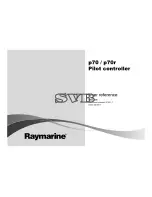
When servicing your marker:
• Make sure a barrel sock is fitted to the NT11.
• Make sure your hopper is removed from the NT11.
• Make sure there are no paintballs in the breech of the NT11.
• Always remove the first stage regulator and relieve all residual gas pressure from the
NT11 before disassembly.
• The NT11 can hold a small residual charge of gas, typically 2 shots, with the first stage
regulator removed. Always discharge the marker in a safe direction to relieve
this residual gas pressure.
BOOST BOLT
ASSEMBLY AND MAINTENANCE
With the bolt in the rear “at rest” position, the primary air supply produces an imbalanced
rearward dominant force, holding the bolt in the rear position. When the NT is fired the solenoid
is energized and allows the secondary air supply to enter the Plunger between the two
020
O-rings
.
The secondary air supply applies force on the back of the spool, driving it forward. As
the spool moves forward the primary air supply is cut off to the spool, and the air in the spool
dump chamber is transferred between the
012 O-ring
and
014 O-ring
on the outside of the
plunger. This influx of air is enough to create a forward dominate force on the bolt, and begins to
drive the bolt forward.
Because the primary air supply to the spool dump chamber is closed before the spool dump
chamber is transferred only a set volume of air is used each cycle which ensures no air is wasted.
When the bolt begins to move forward the
016 bolt sail O-ring
seals inside the cylinder, cutting
off the primary air supply to the shot chamber. The bolt continues moving forward and drops off
the
014 O-ring
on the Plunger, which creates a boost in forward force and greatly increases the
speed on the bolt. As the bolt reaches it’s most forward position it drops off the
012 O-ring
on
the Plunger, and releases the shot chamber down the bolt and fires the paintball.
The self-closing valve is activated before all of the gas in the shot chamber is used,
thus increasing efficiency.
As the shot chamber is released behind the ball the forward force drops and the rearward force
created by the primary air supply quickly becomes the dominant force, and the bolt begins to
return to the rear “at rest” position. At this time, with the spool dump chamber empty and the
solenoid no longer delivering air to the back of the spool, the spool is returned to its rear position
by the spool return spring. With the bolt and spool in the rear position the Boost Bolt Kit is ready
to be cycled again.
W W W . D Y E P A I N T B A L L . C O M
W W W . D Y E P A I N T B A L L . C O M
14
15
BOOST BOLT
ASSEMBLY AND MAINTENANCE
BOLT MAINTENANCE
Regular Boost bolt maintenance is vital to the performance of the NT11. Dirt or debris can reduce
O-ring life and ultimately cause the NT11 to malfunction or leak. The NT11 will continue to function
without lube for a short period of time, however the NT11’s efficiency and performance may be
affected, and o-ring life will be shortened.
Bolt maintenance should always be performed with the gun de-gassed.
STANDARD MAINTENANCE
Remove the bolt with a 1/4” Allen wrench. Only one and a half counterclockwise rotations is
required so that the bolt kit can be pulled out. Check and remove any foreign debris, such as dirt
and paint. Check that there is a thin layer of lube coating all visible O-rings. Apply a small amount
of DYE Slick Lube™ as necessary, excessive lube will not help the NT11’s performance. It is also
recommended to inspect the ball detents, eye pipe, and eye assembly. Make sure the eye pipe is
clean of any dirt or broken paint that may cause the eyes to function improperly. Inspect the ball
detents; look for any excessive wear that may prevent the detents from working as intended. See
pages 18-19 for detailed information.
Summary of Contents for NT11
Page 1: ... ...








































